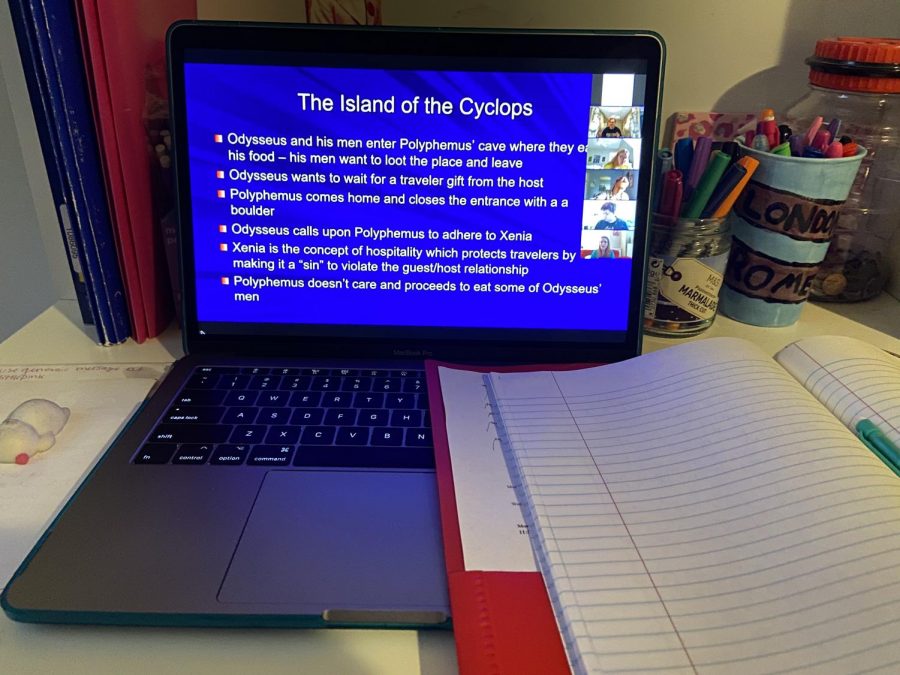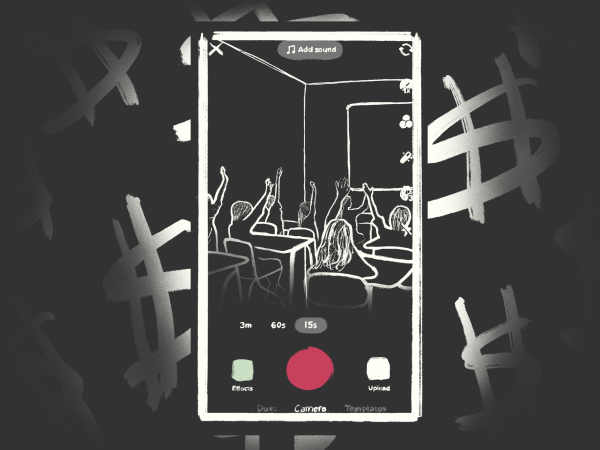The sustainability of online classes
An online zoom lecture from my ENG-210/Mythology class.
When coronavirus’ (COVID-19) impending danger to the U.S. became ever clearer during UNC Wilmington’s spring break, the university quickly prepared and sent out the message that we would be switching to online classes indefinitely and later for the remainder of the semester.
Students and professors quickly scrambled to adjust to this new way of teaching and learning. And so far, it seems to be going well. All of my classes have still been running smoothly and my professors are doing the best they can in these circumstances.
Although in an email sent out by Chancellor Jose V. Sartarelli on April 30, he announced that UNCW was putting together a team to plan for the fall. Chancellor Sartarelli wrote that he hoped they would have some more news by May 30. This message came after an announcement from interim president of the UNC System, Bill Roper in which he said he believes all UNC system institutions will reopen for Fall 2020 classes.
“I expect to reopen our campuses for the Fall 2020 Semester and look forward to welcoming our faculty and students back to their classrooms and labs this fall. To do so, we are working closely with our chancellors to chart a course forward,” wrote Roper.
But with all the uncertainty about when the U.S. can get a full grip on tackling the coronavirus, we cannot know for sure how classes for fall 2020 will look, and then comes the question of how long universities like UNCW can sustain an online curriculum.
Simply put at the university level, some classes and majors like Communication Studies, Computer Science and Creative Writing can get away with an all-online format, but what about the more hands-on classes and majors like Nursing, Marine Biology and Psychology which require in-person labs to conduct classes?
Jennifer Myers, a professor in the Psychology department at UNCW taught five classes this semester, and only one was already an online class. Of the remaining four, Myers had taught one as an online class in previous summers, so that course was a smooth transition.
“The other three classes were one course with three sections and this was a bear because I supervise the undergrad practicum students, it’s their internship for the department,” said Myers. “How do you do an internship? I had to call them in from the community like you guys can’t be roaming around the community 10 hours a week. Their agencies were closing down and the schools [too]. Some of them were at the elementary, middle, [and] high schools and the schools are telling them don’t come back. So, finding meaningful content for those students like online trainings they could take that were free that were open to an undergrad level psychologist, finding podcasts they could listen to on material therapy or individual therapy. All of that had to happen very rapidly and that was unpleasant.”
Jessica Perry, a junior at UNCW, took five classes this semester, one of which was an internship with the Cameron Art Museum. Perry wrote that she was definitely feeling the weight from the sudden switch of in-person to online classes.
“The transition to online classes was pretty rough,” wrote Perry. “A few of my classes were very much reliant on in-person instruction, so I think my professors struggled with the transition to online. I think most of my professors handled the transition to online as best as they could, for the most part. Although, I had a professor or two who seemed to take the “easy way out” during the transition, which resulted in a loss of quality of the class (for example: YouTube links instead of spoken instruction).”
Transitioning from in-person and online classes is one thing, but what if you do not have reliable internet access? This is another hurdle for students trying to finish the remainder of the semester online.
“The university has asked instructors and professors to be very mindful of the fact that not everybody has reliable internet access; they just don’t,” said Myers. “You can’t even go anywhere to find it because everything’s closed. We can’t require attendance to our classes, so I’m holding all these Zoom meetings, and at the very beginning of all of this they were fairly well-attended, but as the last few weeks have gone by and as the quarantine has ground on fewer and fewer people are actually attending our class times. I recognize the acute crisis format for getting people through the end of the semester, but as a university, we would need to make some changes if this was going to continue on into the fall semester. We have to be able to mandate some kind of attendance and participation, and as of right now, we really can’t, and frankly I kind of don’t know what they’re learning. I have no idea and that’s challenging.”
Motivation to start and complete work assigned in online classes is also a struggle that comes with this situation. Sitting behind your laptop in your bed with your phone, TV and other distractions can allow for your motivations to lie elsewhere.
“I didn’t do a great job with online classes,” wrote Perry. “I made decent grades, but I found it difficult to learn through online sources, and I had a hard time finding motivation to do schoolwork.”
We do not have the same daily reminders to get our work done by a certain day as we did when we went back and forth from campus to classes. Instead, we are left with confusion and forgetfulness—all of which are completely understandable during these times.
It is hard to upend a schedule you are used to following day-to-day, even if it has been only for five or six weeks.
“What I’m hearing is that people are struggling to structure themselves and without a doubt, some people are better than others at doing this,” said Myers. “They feel like they’re moving through quicksand. It’s just so hard to focus and concentrate, pick a task and go into it and get it done. Seriously, that seems to be getting worse, and what I hear from students is that they feel—the end of the semester is always stressful without a doubt—but this feels like a different type of stress. It’s kind of the stress all of a sudden without structure and routine and trying to choose and then act accordingly with these projects and learning exercises with no one standing over their shoulder and that’s really challenging. And frankly, I feel that. If it wasn’t for the very structured nature of my clinical practice, I think I’d be in a lot worse shape, as far as that’s concerned, of trying to get myself structured and moving forward.”
I have taken my fair share of online courses throughout my time at UNCW. I actually try to take one to two a semester to lighten up my travel to- and from campus, but going from one or two to all five is completely different. I do not hate online classes, but going fully online was surely a shock, especially when I am paying to have the on-campus/in-person experience of college. But I do know my fair share of people who do hate the fact that the classes have completely shifted online and I understand that.
“I very much prefer in-person classes. I learn best when I am able to listen, engage, and interact,” wrote Perry. “Technically, those things can happen on Zoom, but it just is not the same in terms of quality of experience. Additionally, I have a hard time motivating myself to learn and work when I am at home with my laptop. I definitely feel more motivated and productive in a campus-setting, surrounded by other students and resources.”
One thing is for certain: from this situation, we have also learned that there are certainly more classes that can be offered online just as effectively as in-person sessions. What those classes are, professors and UNCW administrators would have a better idea of, but I know at least one or two of my classes could just as easily be kept as online classes. So, before the times of COVID-19, why was UNCW not offering said classes online?
“In ‘an abundance of caution,’ I can foresee them offering a lot more volume of online teaching, and in my personal opinion, we would need to be able to enforce some type of participation in order to really make this workable,” said Myers.
We may not all love or be succeeding in our online classes, but for now, this is our new normal and thankfully the semester is almost over. We can only hope that the world and specifically the U.S. can get a better grip on handling COVID-19 before the fall 2020 semester so we can return to some sense of previous normalcy with in-person classes.
“I’m not sure how long UNCW can sustain online classes,” wrote Perry. “For one thing, it is definitely not what most students sign up for when they pay to go to UNCW. There are so many resources that tuition goes to that can’t be offered online. Many A+ students have a really hard time making decent grades when classes are online. It just isn’t for everyone. It’s an entirely different way of learning. I think that UNCW can sustain online learning, but big changes should be considered, such as discounted tuition.”
And, a decision about the upcoming fall semester might not come for a while as we continue to face and fight the battle against COVID-19 and weigh each and every option available to keep people healthy and safe.
“We’ll do this for as long as we have to,” said Myers. “I think is the easiest answer and we’ll make it work and it will move the ball forward pedagogically in a learning format more than if we said, ‘Okay we’re just not gonna offer any educational possibility for anyone right now.’ This process is far better than nothing. But I think instructors and professors all have to look very closely at the learning exercises, assessments, and reports we’re asking our students to do. And, I have to tell you and I haven’t done this particularly well yet, because I’m still learning, but there’s a lot of software that will allow me to essentially do a podcast. I can do a whole lecture and post it and so while I’m losing out on real-time questions, which is something that is really critical, at least they can hear a human giving the lecture and go back to all the notes that have been posted for them. That’s another way of making this more sustainable and improving the learning quality.”










